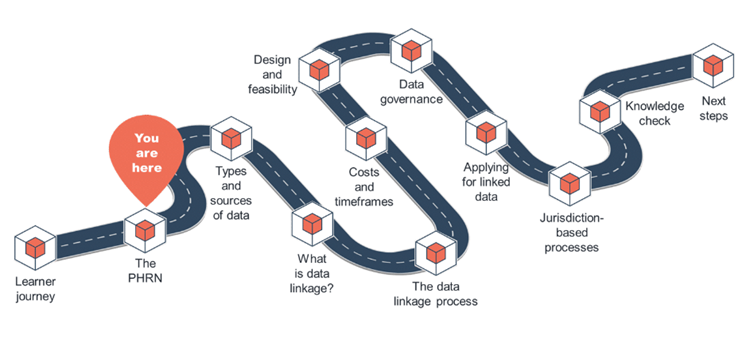The Population Health Research Network’s new online course provides participants with the knowledge and skills required to plan cross-jurisdictional linked data projects and successfully navigate the application and approval process.
The free self-paced course takes around an hour to complete.
It covers the types of data that are commonly available for linkage, the benefits and constraints of administrative data for research, a basic understanding of the data linkage process, and guidance on design and feasibility.
It also details the application and approval process for each jurisdiction, using a standardised format and provides guidance for costs and timeframes.
Visit PHRN’s Online Researcher Training to register.

COURSE OUTLINE
Course Title: How to plan and apply for linked data
Overview: This self-paced online training program has nine modules and a final test, that will equip researchers with the knowledge and skills necessary to develop a feasible data linkage application.
Target Group: The target group for this training program is researchers new to data linkage, seeking to enhance their capabilities in planning and applying for linked data projects.
Course Objectives: Upon completing the course, participants will be able to:
- Understand the various types of data available for linkage.
- Identify the advantages and constraints of using administrative data for research.
- Recollect the data linkage process, including different linkage methods used and an understanding of high-level data linkage flow.
- Describe the steps involved in designing a data linkage project, including cohort and control group selection.
- Describe techniques to measure linkage accuracy and report on the quality of data linkage.
- Explain the regulatory framework governing data linkage and understand the essential governance roles and responsibilities researchers must uphold.
- Understand factors that influence project timeframes and costs, enabling more efficient project planning and resource allocation.
Course Structure: The training program is structured into nine modules, each focusing on a specific aspect of data linkage:
- Module 1: Introduction to the Population Health Research Network
- Module 2: Types and Sources of Data
- Module 3: What is data linkage?
- Module 4: Data Linkage Process
- Module 5: Costs and Timeframes
- Module 6: Design and Feasibility
- Module 7: Data Governance
- Module 8: Applying for Linked Data
- Module 9: Jurisdiction-Based Processes
Assessment: At the conclusion of the course, participants will undertake an online test consisting of 12 questions to evaluate their understanding of the materials covered. Participants who obtain 70% or higher will receive a certificate of completion.


